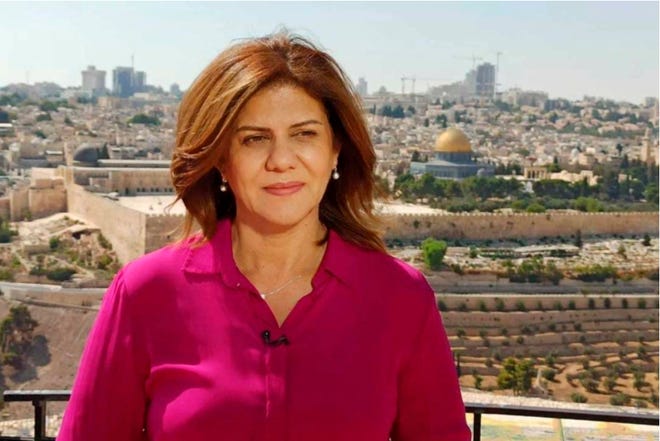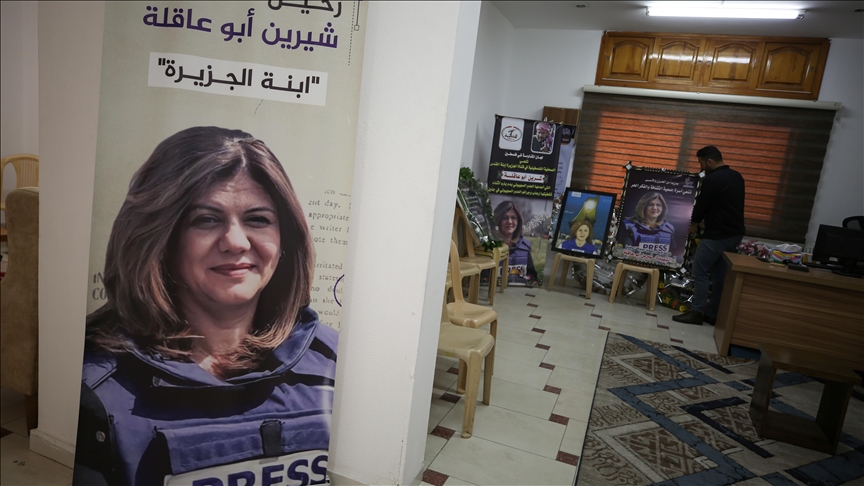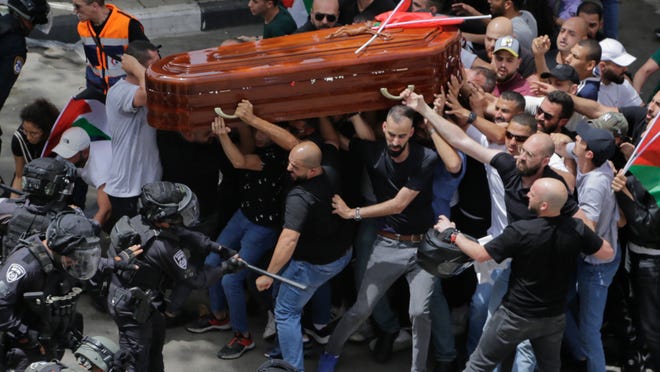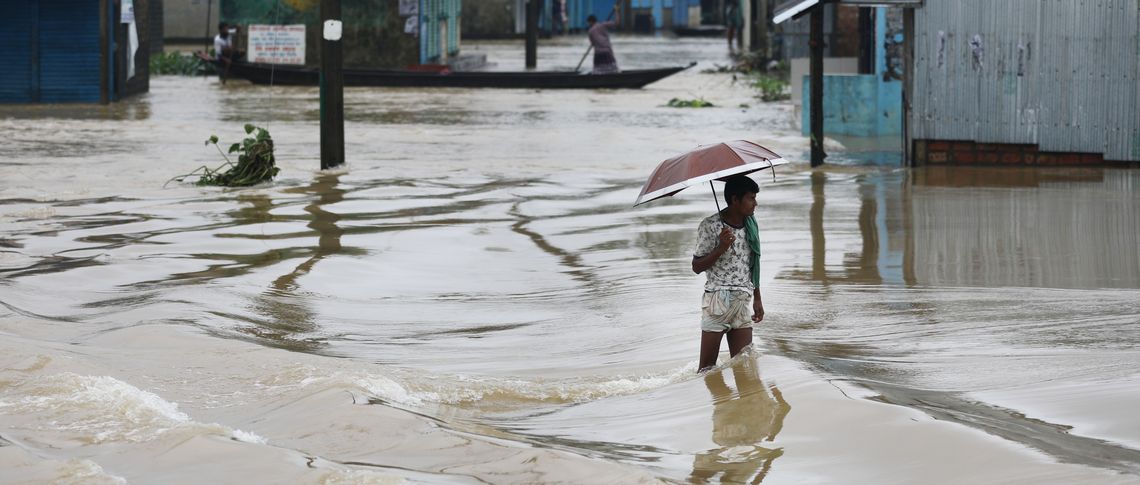Maureen Clare Murphy

Protesters demonstrate against the killing of Shireen Abu Akleh in Paris on 11 May.
On the day that the US celebrates its so-called independence on colonized land, Washington signed off on Israel’s clearing itself of direct responsibility for the killing of prominent Palestinian journalist Shireen Abu Akleh.
A statement attributed to Ned Price, spokesperson for the US State Department, said that American officials “could not reach a definitive conclusion regarding the origin of the bullet that killed” Abu Akleh because it was too badly damaged.
Price’s statement added that US officials “concluded that gunfire from IDF [Israeli military] positions was likely responsible for the death of Shireen Abu Akleh.”
But the State Department seemingly attempted to justify Abu Akleh’s killing by saying that US officials “found no reason to believe that this was intentional but rather the result of tragic circumstances during an IDF-led military operation against factions of Palestinian Islamic Jihad … which followed a series of terrorist attacks on Israel.”
The family pointed to the “numerous eyewitnesses to the killing” and the independent investigations from “multiple local and international media outlets, human rights organizations and the United Nations.”
Those probes all concluded that Abu Akleh was shot by Israeli soldiers and there was no Palestinian gunfire or militants nearby at the time. Some of those probes indicated that Abu Akleh was deliberately targeted.
The Palestinian Authority meanwhile demanded that Israel hand over the rifle fired by a member of an elite Israeli military unit during the raid in Jenin.
Israel also zeroed in on the bullet as a means of deflecting responsibility to the PA while it has not released any of the drone and body camera footage or the GPS locations of its soldiers present in Jenin at the time of Abu Akleh’s killing.
The Abu Akleh family said that “the focus on the bullet has always been misplaced … as if this were some kind of police whodunit that could be solved by a CSI-style forensic test,” referring to the American police procedural television series.
“The truth is that the Israeli military killed Shireen according to policies that view all Palestinians – civilian, press or otherwise – as legitimate targets,” the family added.
The family called on Washington to open an “open, transparent and thorough investigation” and “clarify the extent to which American funds were involved in Shireen’s killing.”
“US-backed Israeli whitewash”
The US probe into Abu Akleh’s killing was led by Michael R. Fenzel a US lieutenant general who oversees so-called security ties between Israel and the Palestinians.
Someone with a vested interest in maintaining the Palestinian Authority’s role as a security subcontractor for the Israeli occupation is hardly an independent observer.
B’Tselem, an Israeli human rights organization, described the State Department statement as a “US-backed Israeli whitewash.”
Through a spokesperson, Mahmoud Abbas, leader of the Palestinian Authority in Ramallah, demanded that “the US hold the Israeli government fully responsible for the crime of killing the martyr Abu Akleh.”
Akram al-Khatib, the Palestinian Authority attorney general who led Ramallah’s investigation into Abu Akleh’s killing, rejected the conclusions of the US probe. He said that “the technical data in our possession indicates that the condition of the shell is viable for matching with the firearm [that shot it].”
The Palestinian Authority foreign ministry said that it would pursue justice for Abu Akleh at the International Criminal Court.
Abu Akleh, a veteran Al Jazeera correspondent and a US citizen, was shot and killed while covering an Israeli raid in the northern West Bank city of Jenin on 11 May. Her producer, Ali Samoudi, was shot in the back and survived.
Abu Akleh was wearing a protective vest and helmet identifying her as a journalist when she was killed.
The State Department added that it would “remain engaged with Israel and the PA [Palestinian Authority] on next steps and urge accountability.”
The US has, however, given Israel the benefit of the doubt every step of the way after Abu Akleh’s killing.
Israel determined ahead of the conclusion of its military’s self-investigation that no soldier would face criminal charges for Abu Akleh’s death.
By definition, according to Israel, her killing could not be a crime because it was a “combat event” – a baseless interpretation of international law that Tel Aviv relies upon to justify its lax open fire regulations resulting in the fatalities of countless Palestinians.
Israeli soldiers are almost never tried and convicted over abuses against Palestinians, and certainly not their commanders or the authors of military policy.
Israeli police meanwhile determined that no police officers will be punished for attacking the pallbearers carrying the slain journalist’s coffin, nearly causing them to drop it, during her funeral in Jerusalem.
PR crisis
Both the US and Israel have treated Abu Akleh’s killing as a public relations crisis rather than a crime demanding justice and accountability.
The State Department’s insistence that the US reached its conclusion “after an extremely detailed forensic analysis” is unlikely to change the perception that it is party to a cover-up.
Nor is the statement’s timing, shortly before US President Joe Biden travels to Israel, the occupied West Bank and Saudi Arabia. The White House has stated that Biden intends to reinforce Washington’s “ironclad commitment to Israel’s security.”
The US provides at least $3.8 billion in military aid to Israel per year.
Biden is also overlooking the 2018 killing of Washington Post columnist Jamal Khashoggi, which the CIA has concluded was committed with the approval of Saudi crown prince Mohammed bin Salman.
Biden’s visit will be the first meeting between a US president and Saudi leadership since Khashoggi’s murder and dismemberment with a bone saw inside the oil-rich kingdom’s consulate in Istanbul.
An unnamed senior White House official who briefed journalists said that Washington seeks to “recalibrate relations” rather than rupturing them “because Saudi Arabia has been a strategic partner of the United States for eight decades.”
Saudi Arabia is also the United States’ largest arms customer, accounting for a quarter of US weapons sold worldwide.
The bullet that killed Shireen Abu Akleh was designed and manufactured in the US, according to Al Jazeera.
Abu Akleh’s killing has attracted rare attention from US Congress, with some 60 legislators, including half of all Democratic senators, calling on the Biden administration to launch an investigation.
The 1997 Leahy Law prohibits the US from providing military assistance to units of foreign militaries when there is credible information that those units violated human rights with impunity.
That law is named for Senator Patrick Leahy of Vermont, who signed on to a letter to the Biden administration calling for a US investigation into Abu Akleh’s killing.
As The New York Times observed, the “need for a resolution” regarding her killing “became more urgent in recent days because it threatened to overshadow discussions” during Biden’s visit to Israel.
“Biden loves Israel”
Abu Akleh is one of only several Palestinians killed in Jenin in recent weeks.
The UN monitoring group OCHA stated last week that “Israeli forces have shot and killed 26 Palestinians, including six children, during search-and-arrest operations across the West Bank” since the beginning of the year, with nearly half of those fatalities occurring in Jenin.
The UN human rights office stated last week that it “is alarmed by the impact of intensified Israeli forces’ operations on the right to life of Palestinians” in the West Bank.
The human rights office said that many of the cases it monitored “indicated that Israeli forces used lethal force in a manner that appears totally inconsistent with international human rights law.”
The State Department didn’t acknowledge those additional deaths or express concerns over Israel’s use of force in its statement.
Meanwhile, Tom Nides, the US ambassador to Israel, tweeted a video of himself grilling hotdogs with Michael Herzog, the Israeli ambassador to the US.
“Looking forward to our own official celebration tomorrow in Jerusalem,” Nides said in his tweet on Monday.
Nides told the Tel Aviv daily Haaretz that “Joe Biden is coming here for the Israeli people.”
“Joe Biden calls himself a Zionist,” Nides added, referring to Israel’s state ideology.
“Joe Biden loves Israel.”
US concludes
Shira Rubin1 Jul 05 2022
An American-led analysis of forensic and ballistic evidence, as well as the separate Israeli and Palestinian investigations, found that the bullet that killed Palestinian American journalist Shireen Abu Akleh likely originated from an Israeli soldier, but added that there was "no reason to believe this was intentional," US State Department spokesman Ned Price said Monday.
Price said that investigators concluded that the bullet which hit Abu Akleh - a longtime correspondent for Al Jazeera news who was shot on May 11 while covering an Israeli military raid in the West Bank city of Jenin - "was badly damaged," preventing "a clear conclusion." The statement sparked angry responses from her family and Palestinian officials.
The Palestinian Authority handed over the bullet to the US Security Coordinator on Saturday, complying with a long-standing demand from Israel.

KEVIN STENT
Justice for Palestine did a guerilla projection of the Palestinian flag on Te Papa after Wellington Mayor Andy Foster vetoed a plan for one on the Michael Fowler Centre. One of the images featured slain journalist Shireen Abu Akleh.
Since the incident, Israel has claimed that without the bullet, it would not be able to determine whether Abu Akleh had been shot by an Israeli gun or by weapons from armed Palestinians in the area at the time of the shooting.
"The USSC found no reason to believe that this was intentional but rather the result of tragic circumstances during an IDF-led military operation against factions of Palestinian Islamic Jihad on May 11, 2022, in Jenin, which followed a series of terrorist attacks in Israel," the statement said, referring to a string of Palestinian attacks in Israel in recent months in which a number of the assailants hailed from Jenin and the surrounding area.
Israeli Prime Minister Yair Lapid said that "the IDF investigation was unable to determine who is responsible for the tragic death of journalist Shireen Abu Akleh, but it was able to determine conclusively that there was no intention to harm her. Israel expresses sorrow over her death."
IDF spokesman Ran Kochav said on the day of Abu Akleh's killing that it was "likely" that she was killed by armed Palestinians before the military later backtracked and conceded that it was possible that an Israeli sniper could have been responsible.

WARWICK SMITH/STUFF
Abu Akleh's killing has sparked outrage and has shone an international spotlight on what Palestinians and human rights activists have for years called a policy of impunity in Israel's military. (File photo)
The investigation, which the Israeli army said has been stalled due to the Palestinian refusal to transfer the bullet, had been looming over US President Joe Biden's July visit to the Middle East, his first as president.
Abu Akleh's killing has sparked outrage and has shone an international spotlight on what Palestinians and human rights activists have for years called a policy of impunity in Israel's military.
Palestinian officials immediately called Abu Akleh's killing an "assassination". Last month, the Palestinian Authority published the results of its own inquiry and said it found that she was killed by a 5.56mm round fired by a Ruger Mini-14 semiautomatic rifle, though it did not say if that model was used by either or both sides - who were exchanging fire the morning of Abu Akleh's killing.
In response to the US State Department announcement, Hussein al-Sheikh, the secretary general of the Executive Committee of the Palestine Liberation Organisation (PLO), told the Palestinian news agency that officials believed the United States was looking to protect Israel.
He said that, absent American support, the Palestinian Authority would continue to pursue the case in the International Criminal Court, based in The Hague.

MAHMOUD ILLEAN/AP
Mourners carry the coffin of slain Al Jazeera veteran journalist Shireen Abu Akleh during her funeral in Jerusalem.
"We will not allow attempts to conceal the truth or to have shy references in pointing the finger of accusation to Israel," said al-Sheikh.
The Israeli group B'Tselem, which documents Israeli violations in the Palestinian territories, said in a statement that "the odds that those responsible for the killing of Shireen Abu Akleh will be held to account are all but nonexistent."
On June 24, the UN High Commissioner for Human Rights said that Israel was the most probable source of the bullet that killed Abu Akleh. The UN findings– along with the investigations published by The Washington Post, the New York Times, the Associated Press, CNN and the investigative group Bellingcat - added momentum to a growing calls for the United States to push more publicly for a thorough and transparent probe.
In June, 24 senators called for the United States to be "directly involved in investigating" the case, while Abu Akleh's brother, Anton, said America should take it over completely from the Israeli military.
"The focus on the bullet has always been misplaced and was an attempt by the Israelis to spin the narrative in its favor," said a statement from the Abu Akleh family.
The statement said that the family had hoped, and still hopes, that the FBI or another American authority would regard Abu Akleh's death as grounds for a "murder investigation".
The Washington Post
Ellen Knickmeyer, Matthew Lee and Joseph Krauss
Associated Press
WASHINGTON — U.S. officials have concluded that gunfire from Israeli positions likely killed Al-Jazeera journalist Shireen Abu Akleh but that there was "no reason to believe" her shooting was intentional, the State Department said Monday.
The finding, in a statement from State Department spokesman Ned Price, came after what the U.S. said were inconclusive tests under U.S. oversight of the bullet recovered from Abu Akleh's body. It said "independent, third-party examiners" had conducted an "extremely detailed forensic analysis."
"Ballistic experts determined the bullet was badly damaged, which prevented a clear conclusion" as to who fired the shot, Price said in the statement.
Journalist killed:Al Jazeera reporter Shireen Abu Akleh killed during Israeli raid in West Bank
Abu Akleh, a veteran Palestinian-American correspondent who was well known throughout the Arab world, was shot and killed while covering an Israeli military raid on May 11 in the Jenin refugee camp in the occupied West Bank. Palestinian eyewitnesses, including her crew, say Israeli troops killed her and that there were no militants in the immediate vicinity.

Israel says she was killed during a complex battle with Palestinian militants and that only a forensic analysis of the bullet would confirm whether it was fired by an Israeli soldier or a Palestinian militant. It has strongly denied she was deliberately targeted, but says an Israeli soldier may have hit her by mistake during an exchange of fire with a militant.
U.S. security officials had examined the results of separate Palestinian and Israeli investigations and "concluded that gunfire from IDF positions was likely responsible for the death of Shireen Abu Akleh," Price said.
The U.S. "found no reason to believe that this was intentional but rather the result of tragic circumstances during an IDF-led military operation against factions of Palestinian Islamic Jihad," Price said.
The Israeli military presented the findings as part of its own investigation in a statement that was likely to anger the Palestinian Authority, which had adamantly rejected any Israeli role in the probe and refused to share the bullet with Israeli authorities.
The military said that while the bullet remained in the custody of U.S. officials throughout the process, it was examined by Israeli experts in a forensic laboratory in Israel.
Lt. Gen. Aviv Kohavi, the army chief of staff, ordered the investigation be continued "using all available means," the military said in a statement. It said any decision on whether to launch criminal investigation would only be made after the operational investigation is completed.
The Palestinian Authority and Al Jazeera accused Israeli forces of deliberately targeting Abu Akleh within hours of her death.
An Associated Press reconstruction of her killing lent support to accounts by Palestinian eyewitnesses, including her crew, that she was killed by Israeli forces. Subsequent investigations by CNN, the New York Times and the Washington Post reached similar conclusions.
Krauss reported from Ottawa, Ontario. Associated Press reporter Ilan Ben Zion in Jerusalem contributed to this report.
Shireen Abu Akleh killed while covering Israeli military raid in West Bank in May
Awad Rajoub |04.07.2022

RAMALLAH, Palestine
The Palestinian Authority (PA) on Monday rejected “manipulation” of investigations into the killing of Al Jazeera journalist Shireen Abu Akleh.
Abu Akleh, 51, was shot dead on May 11 while covering an Israeli military raid near the Jenin refugee camp in the occupied West Bank.
While Palestinian officials and her employer Al Jazeera accused Israel of killing the reporter, Tel Aviv denied any responsibility.
On Saturday, the PA said it had handed the bullet that killed Abu Akleh to a US team to conduct a forensic examination.
The US, however, said Monday that there was no "definitive conclusion" on the origin of the bullet. It, however, concluded that the gunfire from the Israeli position was "likely responsible" for the reporter’s death.
“We will not accept under any circumstances the manipulation of the outcomes of Palestinian investigations, and will continue the procedures on her assassination in international courts, particularly the International Criminal Court, since Israel is responsible for her killing and must bear the consequences,” PA spokesman Nabil Abu Rudeineh said statements cited by the state news agency Wafa.
Abu Rudeineh “deeply regretted” the Israeli government’s disavowal of its responsibilities for the journalist’s death, calling on the US administration to maintain its credibility and hold Israel fully responsible for Abu Akleh’s murder.
On May 26, Palestinian Attorney-General Akram al-Khatib announced that an examination of Abu Akleh’s body confirmed that she was killed by an armor-piercing projectile fired directly at her head by an Israeli sniper.
Several leading media agencies, including Al Jazeera, CNN, Associated Press, Washington Post, and the New York Times, conducted their own investigations, which all came to an end that Abu Akleh was killed by an Israeli bullet.
*Writing by Bassel Barakat in Ankara
Bullet Too Damaged to Determine Who Killed Al Jazeera Journalist, US Finds
Monday, 04 July 2022 12:37 PM EDT
Test results of the bullet that killed Al Jazeera journalist Shireen Abu Akleh in Jenin in May were inconclusive, the U.S. State Department announced on Monday, The Jerusalem Post reported.
"After an extremely detailed forensic analysis, independent, third-party examiners, as part of a process overseen by the US Security Coordinator (USSC) could not reach a definitive conclusion regarding the origin of the bullet that killed Palestinian-American journalist Shireen Abu Akleh," the State Department statement read. "Ballistics determined that the bullet was badly damaged, which prevented a clear conclusion."
However, the U.S. said that after examining additional information and reviewing the probes carried out by the IDF and the Palestinian Authority, it was "likely" that Abu Akleh was killed by gunfire originating in Israeli positions.
The State Department stressed that "in addition to the forensic and ballistic analysis, the USSC was granted full access to both Israel Defense Forces (IDF) and Palestinian Authority (PA) investigations over the last several weeks.
"By summarizing both investigations the USSC concluded that gunfire from IDF positions was likely responsible for the death of Shireen Abu Akleh. The USSC found no reason to believe that this was intentional but rather the result of tragic circumstances during an IDF-led military operation against factions of Palestinian Islamic Jihad."
The ballistic examination was conducted by Israeli experts in a forensic laboratory in Israel, with USSC representatives present during the entire process, The Jerusalem Post reported.
Abu Akleh was killed during an Israeli raid in the Jenin refugee camp in mid-May. During the arrest operation, a firefight broke out between IDF forces and Palestinian gunmen, and Abu Akleh was shot in the head, The Times of Israel reported.
The PA only agreed to transfer the bullet to the US Embassy in Jerusalem for examination on Saturday after it had refused Israel's request for weeks for a joint investigation or for the PA to make the round available so that a proper test could be carried out.
Defense Ministry Benny Gantz expressed condolences for Abu Akleh's death, although he stressed that the responsibility for her killing remained unclear, according to The Times of Israel.
Gantz further emphasized that during the Jenin gun battle "hundreds of bullets were fired at IDF troops, which responded with firepower of their own, only in the direction of the sources of the shooting."

.png)




